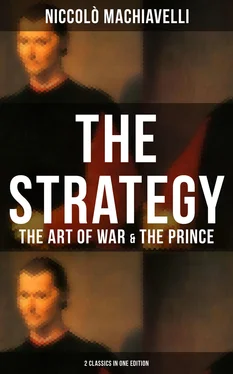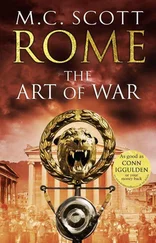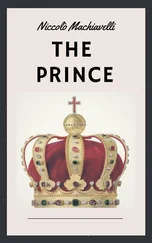Chapter 7 - Of New Princedoms Acquired By the Aid of Others and By Good Fortune
They who from a private station become Princes by mere good fortune, do so with little trouble, but have much trouble to maintain themselves. They meet with no hindrance on their way, being carried as it were on wings to their destination, but all their difficulties overtake them when they alight. Of this class are those on whom States are conferred either in return for money, or through the favour of him who confers them; as it happened to many in the Greek cities of Ionia and the Hellespont to be made Princes by Darius, that they might hold these cities for his security and glory; and as happened in the case of those Emperors who, from privacy, attained the Imperial dignity by corrupting the army. Such Princes are wholly dependent on the favour and fortunes of those who have made them great, than which supports none could be less stable or secure; and they lack both the knowledge and the power that would enable them to maintain their position. They lack the knowledge, because unless they have great parts and force of character, it is not to be expected that having always lived in a private station they should have learned how to command. They lack the power, since they cannot look for support from attached and faithful troops. Moreover, States suddenly acquired, like all else that is produced and that grows up rapidly, can never have such root or hold as that the first storm which strikes them shall not overthrow them; unless, indeed, as I have said already, they who thus suddenly become Princes have a capacity for learning quickly how to defend what Fortune has placed in their lap, and can lay those foundations after they rise which by others are laid before.
Of each of these methods of becoming a Prince, namely, by merit and by good fortune, I shall select an instance from times within my own recollection, and shall take the cases of Francesco Sforza and Cesare Borgia. By suitable measures and singular ability, Francesco Sforza rose from privacy to be Duke of Milan, preserving with little trouble what it cost him infinite efforts to gain. On the other hand, Cesare Borgia, vulgarly spoken of as Duke Valentino, obtained his Princedom through the favourable fortunes of his father, and with these lost it, although, so far as in him lay, he used every effort and practised every expedient that a prudent and able man should, who desires to strike root in a State given him by the arms and fortune of another. For, as I have already said, he who does not lay his foundations at first, may, if he be of great parts, succeed in laying them afterwards, though with inconvenience to the builder and risk to the building. And if we consider the various measures taken by Duke Valentino, we shall perceive how broad were the foundations he had laid whereon to rest his future power.
These I think it not superfluous to examine, since I know not what lessons I could teach a new Prince, more useful than the example of his actions. And if the measures taken by him did not profit him in the end, it was through no fault of his, but from the extraordinary and extreme malignity of Fortune.
In his efforts to aggrandize the Duke his son, Alexander VI had to face many difficulties, both immediate and remote. In the first place, he saw no way to make him Lord of any State which was not a State of the Church, while, if he sought to take for him a State belonging to the Church, he knew that the Duke of Milan and the Venetians would withhold their consent; Faenza and Rimini being already under the protection of the latter. Further, he saw that the arms of Italy, and those more especially of which he might have availed himself, were in the hands of men who had reason to fear his aggrandizement, that is, of the Orsini, the Colonnesi, and their followers. These therefore he could not trust. It was consequently necessary that the existing order of things should be changed, and the States of Italy thrown into confusion, in order that he might safely make himself master of some part of them; and this became easy for him when he found that the Venetians, moved by other causes, were plotting to bring the French once more into Italy. This design he accordingly did not oppose, but furthered by annulling the first marriage of the French King.
King Louis therefore came into Italy at the instance of the Venetians, and with the consent of Pope Alexander, and no sooner was he in Milan than the Pope got troops from him to aid him in his enterprise against Romagna, which Province, moved by the reputation of the French arms, at once submitted. After thus obtaining possession of Romagna, and after quelling the Colonnesi, Duke Valentino was desirous to follow up and extend his conquests. Two causes, however, held him back, namely, the doubtful fidelity of his own forces, and the waywardness of France. For he feared that the Orsini, of whose arms he had made use, might fail him, and not merely prove a hindrance to further acquisitions, but take from him what he had gained, and that the King might serve him the same turn. How little he could count on the Orsini was made plain when, after the capture of Faenza, he turned his arms against Bologna, and saw how reluctantly they took part in that enterprise. The King’s mind he understood, when, after seizing on the Dukedom of Urbino, he was about to attack Tuscany; from which design Louis compelled him to desist. Whereupon the Duke resolved to depend no longer on the arms or fortune of others. His first step, therefore, was to weaken the factions of the Orsini and Colonnesi in Rome. Those of their following who were of good birth, he gained over by making them his own gentlemen, assigning them a liberal provision, and conferring upon them commands and appointments suited to their rank; so that in a few months their old partisan attachments died out, and the hopes of all rested on the Duke alone.
He then awaited an occasion to crush the chiefs of the Orsini, for those of the house of Colonna he had already scattered, and a good opportunity presenting itself, he turned it to the best account. For when the Orsini came at last to see that the greatness of the Duke and the Church involved their ruin, they assembled a council at Magione in the Perugian territory, whence resulted the revolt of Urbino, commotions in Romagna, and an infinity of dangers to the Duke, all of which he overcame with the help of France. His credit thus restored, the Duke trusting no longer either to the French or to any other foreign aid, that he might not have to confront them openly, resorted to stratagem, and was so well able to dissemble his designs, that the Orsini, through the mediation of Signor Paolo (whom he failed not to secure by every friendly attention, furnishing him with clothes, money, and horses), were so won over as to be drawn in their simplicity into his hands at Sinigaglia. When the leaders were thus disposed of, and their followers made his friends, the Duke had laid sufficiently good foundations for his future power, since he held all Romagna together with the Dukedom of Urbino, and had ingratiated himself with the entire population of these States, who now began to see that they were well off.
And since this part of his conduct merits both attention and imitation, I shall not pass it over in silence. After the Duke had taken Romagna, finding that it had been ruled by feeble Lords, who thought more of plundering than correcting their subjects, and gave them more cause for division than for union, so that the country was overrun with robbery, tumult, and every kind of outrage, he judged it necessary, with a view to render it peaceful and obedient to his authority, to provide it with a good government. Accordingly he set over it Messer Remiro d’Orco, a stern and prompt ruler, who being entrusted with the fullest powers, in a very short time, and with much credit to himself, restored it to tranquillity and order. But afterwards apprehending that such unlimited authority might become odious, the Duke decided that it was no longer needed, and established in the centre of the Province a civil Tribunal, with an excellent President, in which every town was represented by its advocate. And knowing that past severities had generated ill-feeling against himself, in order to purge the minds of the people and gain their good-will, he sought to show them that any cruelty which had been done had not originated, with him, but in the harsh disposition of his minister. Availing himself of the pretext which this afforded, he one morning caused Remiro to be beheaded, and exposed in the market place of Cesena with a block and bloody axe by his side. The barbarity of which spectacle at once astounded and satisfied the populace.
Читать дальше












